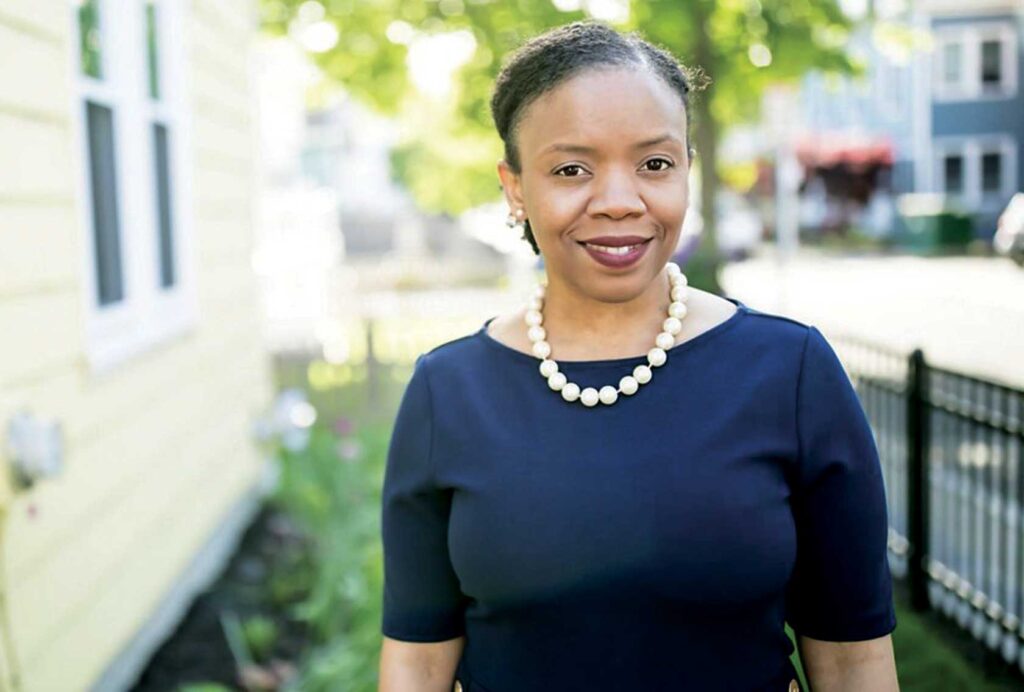Are Black CEO departures signaling move away from DEI?
Reasons for departure vary, but trend is concerning

Banner Business Sponsored by The Boston Foundation
In the wake of the murder of George Floyd, and the protests that followed, companies and organizations across the country saw shifts in how they handled diversity, equity and inclusion initiatives.
But some of that momentum may be faltering. Since the start of the year, at least 10 Black leaders and executives have left prominent roles in Massachusetts organizations, from industries spanning health care and the life sciences to higher education to the financial sector.
The trend was first identified in a Boston Globe commentary piece last month.
It’s the kind of shift that, if it really does indicate a pattern, could mark a move away from the diversity efforts that sprung up in 2020, but it might be too soon to say.
Marguerite Fletcher, a DEI consultant and chair of the board at YW Boston, called the departures “disturbing and disappointing” but said she was hesitant to draw big conclusions without more information.
“If I saw this happening within one organization, that they had turnover of a large number of people even at a junior level in a period of time, I would say, even if all those people told you they had reasons in their exit interviews, it’s worth looking to see if there’s something going on in the system,” Fletcher said. “But in this case, we’re talking about multiple organizations.”
The departures have included some leaders who entered their roles recently and those who joined a field where the number of leaders of color are limited.
For example, Mannika Bowman took the helm at the Massachusetts branch of the Nature Conservancy in February, taking over a prominent organization in the nature and conservation space, which has few leaders — especially female leaders — of color.
Overall, the 10 executives identified in the Globe commentary had an average tenure of about three years. Half of them served about or less than two years in their role. None clocked in at more than six years in the top role (though Beth Chandler, who had the longest tenure in her role as president and CEO at YW Boston at just shy of six years, had served as interim president for a year prior, and as a vice president at the organization for nearly five).
Many were the first Black leaders at their organizations.

Cain Hayes was the former chief executive of Point32Health, the state’s second-largest health insurer. PHOTO: JEN BARKER WORLEY PHOTOGRAPHY
The shift comes after initial gains in diversity following 2020. In a survey conducted by CNBC and the Executive Leadership Council in 2023, just shy of three-quarters of Black executives saw positive changes in hiring, retention and promotion of Black employees since Floyd’s murder, though the same executives also identified more work that needed to be done.
Now, the exits of Black leaders leave advocates questioning how to keep up the push.
The departures stem from a variety of circumstances, said Nicole Obi president and CEO at the Black Economic Council of Massachusetts, but in many cases, she said, she thinks they boil down to how organizations handle diversity, equity and inclusion efforts.
“I think the broader point is true,” Obi said. “The fact is that Black CEOs are leaving town. I think the reasons vary.”
The departure of the Black executives comes as part of a changing landscape that has been shifting since the U.S. Supreme Court’s July 2023 decision striking down affirmative action, said Iván Espinoza-Madrigal, executive director of Lawyers for Civil Rights.
But he said he views those shifts in the corporate landscape that are based on the Supreme Court decision as misguided.
While he says Lawyers for Civil Rights has been seeing, what he called, attacks on DEI across industries, the ruling was limited to the college admissions process, not the hiring and operations of companies and businesses.
“Nothing in the Supreme Court’s decision says that our workplaces should dilute commitments to DEI, but many companies have used Supreme Court’s recent decision as a convenient excuse to walk away from DEI,” Espinoza-Madrigal said.
The loss of diverse leadership, he said, can weaken “vital connections” between companies and the communities they serve and hire from. And it raises questions about to how to maintain diversity gains and goals that rose, in recent years, following the murder of George Floyd.
“It is critically important for increasingly diverse communities to see themselves reflected in organizations, agencies and corporate settings,” Espinoza-Madrigal said. “Recent changes in the composition of executive leadership in Boston are highly concerning because [they] represent the dilution in progress we made as a city and business community to advance DEI.”
Fletcher, through her work as a DEI consultant, said that a lack of understanding as well as fear around the impacts of the Supreme Court’s decision — sometimes rightly placed, but often not — can make DEI work now challenging.
“I think it’s a tough time to be working in this space,” she said.
She also said she wonders if there might be a sense of complacency, that the immediate aftermath of Floyd’s murder created a spark that has, to some degree, been forgotten.
“I think a lot of people who weren’t really steeped in this got riled up when they watched George Floyd get murdered in 2020, and people really wanted to do something so people made some efforts,” she said. “Unfortunately, as a society, we kind of have a short attention span and then we move on to other stuff.”
In other companies, the focus on expanding opportunities could be there, but efforts could be limited mostly to putting a leader of color in charge — what Obi described as focusing mostly on the “D” part of DEI — without paying enough attention to equity or inclusion initiatives.
“People assume that a diverse candidate in a leadership position is going to be able to address those other areas, and that is just simply not the case,” Obi said. “The work needs to continue around making sure that there’s equity throughout the processes, whether it’s the evaluation processes or the hiring practices. There’s more to it.”
In January, the Building Movement Project released a report which surveyed more than 3,000 nonprofit staff. The report found that CEOs and executive directors of color were less likely to feel that staff supported their leadership and accepted the leaders holding the staff accountable, compared to their white counterparts.
The report found a similar gap in support and trust from the organizations’ boards. In many cases, leaders of color reported receiving less support as they transitioned into top roles.
“Let’s say you go out there and you find this dynamic CEO of color and you’re feeling really great about it, and then you just leave them out there dangling without the organization actually being committed to their success, that’s not going to work,” Fletcher said.
Obi said she worries that the loss of an executive of color in a company where that diverse leader is considered the solution to improving access could put a damper on setting up other leaders of color in executive roles.
“For those that gave it a try and it didn’t work, it may feel like it was a failure,” she said.
It could also make candidates of color less likely to pursue the roles in Massachusetts, Obi said.
“It’s the impression that we are making on those that are qualified for leadership positions but concerned that it seems that we’re experiencing a setback in Black executives being successful here in their roles,” she said.
Actions around diversity in college admissions — where Espinoza-Madrigal said the Supreme Court’s decision does apply — were also on the agenda last week, as the Healey-Driscoll Administration released a new report with recommendations to support diversity in higher education at institutions in Massachusetts.
That report, which was published Oct. 16, included recommendations like increasing exposure and access to higher education opportunities for K-12 students, reengaging adult learners, creating innovative recruitment policies and increasing financial aid and other support for historically underserved and underrepresented students.
The recommendations from the state came from the state’s Advisory Council to Advance Representation in Education, a group that includes state education leaders and student representatives, which was convened ahead of the July 2023 Supreme Court decision.
“While nationally there are increasingly attacks on efforts to enhance diversity, equity, and inclusion, in Massachusetts, we remain dedicated to fighting for equity for historically underrepresented students and continuing inclusivity and representation in education,” said Education Secretary Patrick Tutwiler, who chairs the council, in a statement.
The Healey-Driscoll Administration touted the new recommendations as the latest in a series of state efforts to increase access to higher education in the state. Those steps have included making community college free to Massachusetts residents, increased financial aid support and an earlier round of state guidance on student diversity last October.
But Obi cautioned against considering this moment’s setbacks as unmitigated defeat. Even as companies and organizations see a departure of Black leaders, she said there is a pipeline of qualified candidates of color to fill the role.
Fletcher, too, said she doesn’t feel hopeless, saying that when she started working as a lawyer in her 20s, if she was walking around downtown and saw other Black people in suits, she knew them by name or at least reputation.
“It’s totally different now,” she said. “It feels like there are a lot more people of color working in our organizations and coming on up.”
And in some cases that transition is seeing a new Black leader take over. For example, after Kenn Turner left the Massachusetts Life Sciences Center, a quasi-public state agency focused on supporting and expanding the state’s biotechnology sector, Kirk Taylor, a Black neurologist and biopharma executive with a history of driving DEI efforts, was tapped to fill the role.
Despite challenges, this moment is, Obi said, a chance to learn.
“I certainly don’t want anybody to be discouraged and to give up, but I do think that we can take this moment to learn we might be able to do things better as we move forward, and that is to go beyond the ‘D’ in the DEI space,” Obi said.






